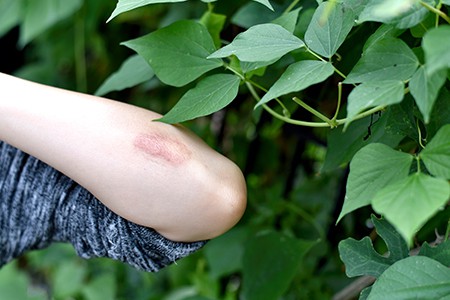 Poison Ivy and Poison Oak rashes are caused by an allergy to the resin of these plants – called Rhus plants. You don’t have to come in direct contact with the leaves, roots, or branches of Rhus plants to get the rash. The plant resin can reach your skin indirectly when you touch clothing or a pet that carries the plant resin.
Poison Ivy and Poison Oak rashes are caused by an allergy to the resin of these plants – called Rhus plants. You don’t have to come in direct contact with the leaves, roots, or branches of Rhus plants to get the rash. The plant resin can reach your skin indirectly when you touch clothing or a pet that carries the plant resin.
While some people never become allergic to Rhus plants, most people become sensitized at some point and remain allergic. Unfortunately, it is difficult to desensitize people allergic to Rhus plants. This is typically performed through an allergist.
Is Poison Ivy contagious?
Your Poison Ivy rash is not contagious. The fluid in the blisters does not spread the rash. However, if the Rhus resin is still on your clothing or skin and you touch someone with that portion of your clothing or skin, then that person may develop a rash if they are allergic.
How are Rhus rashes treated?
Rhus rashes are self-limited – sooner or later they clear up without treatment. Poison Ivy and Poison Oak rashes are treated by Dr. Green, usually with creams and occasionally with systemic cortisone if necessary.
Don’t put anything on your rash except the prescription cream, water, or a vinegar-water mixture. You may bathe or shower as usual; keep the water as cool as you can stand and don’t use soap on your rash, as it irritates the skin.
Can the Rhus rash be prevented?
The only way to prevent a Rhus rash is to avoid contact with the plant resin. If you think you’ve been in contact with the resin, you should immediately shower or wash the exposed area in an attempt to remove the resin. This is sometimes effective.

Susan E.
OUR OFFICE IS COMPLIANT WITH THE CURRENT MARYLAND REGULATIONS INCLUDING: 10.32.09: Delegation and Assignment of Performance of Cosmetic Medical Procedures and Use of Cosmetic Medical Devices. This is a Maryland safety regulation that governs who can legally perform medical cosmetic procedures. Dr. Green administers all injectable treatments (including Botox™, Juvederm™, Voluma™, Kybella™, and other fillers & Sclerotherapy) and laser treatments.
Sign up for monthly promotions and office updates!
By submitting this form, you are consenting to receive marketing emails from: David Green M.D. and LaserDerm & Vein Centers of Maryland, 4800 Montgomery Lane L50, Bethesda, MD, 20814, US, http://www.laserderm.net. You can revoke your consent to receive emails at any time by using the SafeUnsubscribe® link, found at the bottom of every email. Emails are serviced by Constant Contact.
Have Questions & Want More Information?
- Copyright © 2024 LaserDerm Vein Centers of Maryland
- Web Development by NavaWeb
